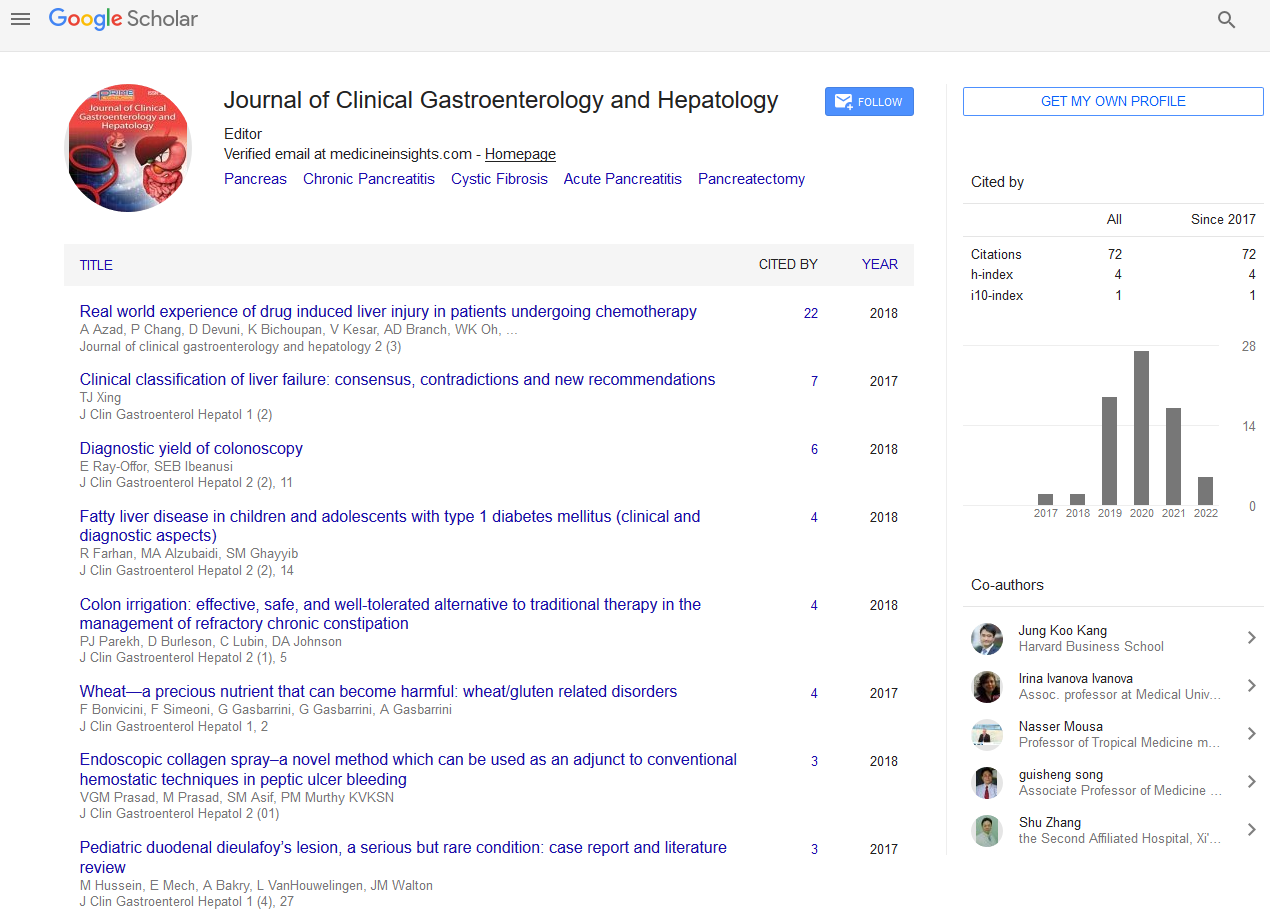Commentary - (2024) Volume 8, Issue 1
Unlocking the Mysteries of the Gut: Understanding its Role in Health
Sara Akiyama*
Department of Gastrectomy, Osaka University, Japan
*Correspondence:
Sara Akiyama,
Department of Gastrectomy, Osaka University,
Japan,
Email:
Received: 31-Jan-2024, Manuscript No. IPJCGH-24-19081;
Editor assigned: 02-Feb-2024, Pre QC No. IPJCGH-24-19081 (PQ);
Reviewed: 16-Feb-2024, QC No. IPJCGH-24-19081;
Revised: 21-Feb-2024, Manuscript No. IPJCGH-24-19081 (R);
Published:
28-Feb-2024, DOI: 10.36648/2575-7733.8.1.05
Description
The human body is an intricate system of organs and
processes, each playing a vital role in maintaining overall
health and well-being. Among these, the gut often referred to
as the gastrointestinal tract stands out as a powerhouse, with
functions extending far beyond digestion. While traditionally
seen as a mere processing unit for food, scientific research
has unveiled the complex and fascinating world of the gut
microbiome, shedding light on its profound impact on various
aspects of health. At the heart of the gut’s functionality lies
the microbiome, an ecosystem teeming with trillions of
microorganisms such as bacteria, viruses, fungi, and archaea.
This bustling community, primarily inhabiting the large
intestine, forms a symbiotic relationship with the human body,
influencing digestion, metabolism, immunity, and even mental
health. The composition of the gut microbiome is incredibly
diverse, varying from person to person based on factors
like diet, lifestyle, genetics, and environment. While some
microbial species are beneficial, aiding in nutrient absorption
and immune regulation, others may be harmful if allowed to
proliferate unchecked. Maintaining a healthy balance of these
microorganisms is crucial for optimal gut function and overall
health. Emerging research suggests that the gut microbiome
plays a pivotal role in preventing a myriad of diseases, ranging
from digestive disorders to autoimmune conditions and mental
health issues. Dysbiosis, an imbalance in the gut microbiome,
has been implicated in the development of conditions such as
irritable bowel syndrome inflammatory bowel disease obesity,
diabetes, and even mood disorders like depression and anxiety.
Furthermore, the gut microbiome interacts closely with
the immune system, shaping its response to pathogens and
foreign invaders. A healthy gut microbiome helps modulate
immune function, reducing the risk of allergies, infections, and
autoimmune diseases. Maintaining a thriving gut microbiome
is achievable through lifestyle choices and dietary habits
that support microbial diversity and balance. Here are some
strategies to promote gut health. Consume a varied diet rich
in fruits, vegetables, whole grains, legumes, nuts, and seeds.
These fiber-rich foods provide nourishment for beneficial gut
bacteria, promoting microbial diversity. Incorporate fermented
foods like yogurt, kefir, kimchi, sauerkraut, and kombucha into
your diet. These foods contain probiotics live beneficial bacteria
that can enhance gut health. Include prebiotic-rich foods such
as garlic, onions, leeks, asparagus, bananas, and Jerusalem
artichokes. Prebiotics serve as fuel for probiotics, helping them
thrive in the gut. High-sugar and processed foods can disrupt
the gut microbiome, leading to inflammation and dysbiosis.
Minimize intake of these foods to support gut health. Adequate
hydration is essential for maintaining optimal digestion and
supporting the movement of waste through the intestines.
Chronic stress can negatively impact the gut microbiome and
digestive function. Practice stress-reducing techniques such
as meditation, deep breathing, yoga, or regular exercise.
While antibiotics are essential for treating bacterial infections,
overuse can disrupt the balance of gut bacteria. Use antibiotics
judiciously and consider probiotic supplementation during
and after antibiotic therapy. The gut is not merely a digestive
organ but a dynamic ecosystem intricately linked to overall
health and well-being. By nurturing a diverse and balanced
gut microbiome through lifestyle modifications and dietary
interventions, individuals can bolster their immune system,
improve digestion, and reduce the risk of various diseases.
Acknowledgement
None.
Conflict Of Interest
The authors declare that they have no conflict of interest.
Citation: Akiyama S (2024) Unlocking the Mysteries of the Gut: Understanding its Role in Health. J Clin Gastroenterol Hepatol.
8:05.
Copyright: © 2024 Akiyama S. This is an open-access article distributed under the terms of the Creative Commons Attribution
License, which permits unrestricted use, distribution, and reproduction in any medium, provided the original author and source
are credited.

